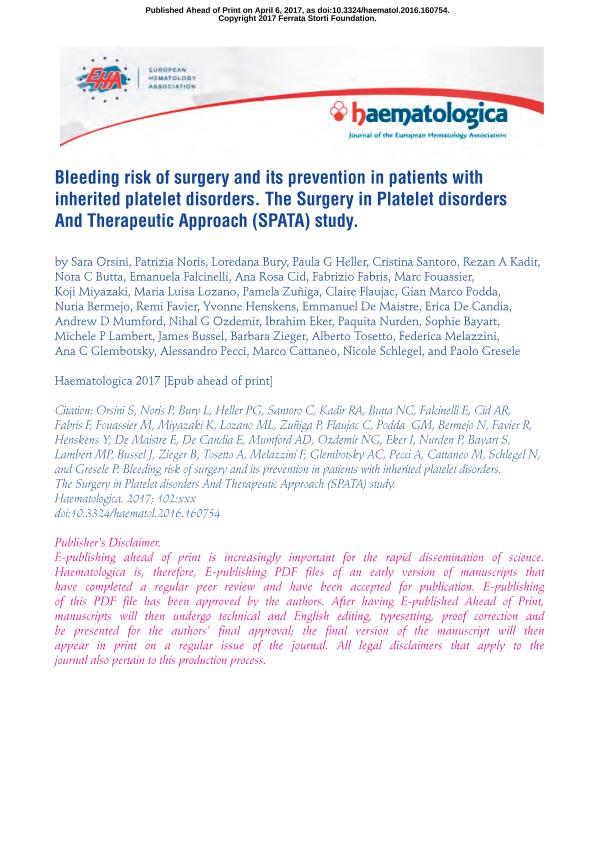Artículo
Bleeding risk of surgery and its prevention in patients with inherited platelet disorders. The Surgery in Platelet disorders And Therapeutic Approach (SPATA) study
Orsini, Sara; Noris, Patrizia; Bury, Loredana; Heller, Paula Graciela ; Santoro, Cristina; Kadir RA; Butta, Nora C.; Falcinelli, Emanuela; Cid, Ana Rosa; Fabris, Fabrizio; Fouassier, Marc; Miyazaki, Koji; Lozano, Maria Luisa; Zuñiga, Pamela; Flaujac, Claire; Podda, Gian Marco; Bermejo, Nuria; Favier, Remi; Henskens, Yvonne; De Maistre, Emmanuel; De Candia, Erica; Mumford, Andrew; Ozdemir, Gul Nihal; Eker, Ibrahim; Nurden, Paquita; Bayart, Sophie; Lambert, Michele P; Bussel, James; Zieger, Barbara; Tosseto, Alberto; Melazzini, Federica; Glembotsky, Ana Claudia
; Santoro, Cristina; Kadir RA; Butta, Nora C.; Falcinelli, Emanuela; Cid, Ana Rosa; Fabris, Fabrizio; Fouassier, Marc; Miyazaki, Koji; Lozano, Maria Luisa; Zuñiga, Pamela; Flaujac, Claire; Podda, Gian Marco; Bermejo, Nuria; Favier, Remi; Henskens, Yvonne; De Maistre, Emmanuel; De Candia, Erica; Mumford, Andrew; Ozdemir, Gul Nihal; Eker, Ibrahim; Nurden, Paquita; Bayart, Sophie; Lambert, Michele P; Bussel, James; Zieger, Barbara; Tosseto, Alberto; Melazzini, Federica; Glembotsky, Ana Claudia ; Pecci, Alessandro; Cattaneo, Marco; Schlegel, Nicole; Gresele, Paolo
; Pecci, Alessandro; Cattaneo, Marco; Schlegel, Nicole; Gresele, Paolo
 ; Santoro, Cristina; Kadir RA; Butta, Nora C.; Falcinelli, Emanuela; Cid, Ana Rosa; Fabris, Fabrizio; Fouassier, Marc; Miyazaki, Koji; Lozano, Maria Luisa; Zuñiga, Pamela; Flaujac, Claire; Podda, Gian Marco; Bermejo, Nuria; Favier, Remi; Henskens, Yvonne; De Maistre, Emmanuel; De Candia, Erica; Mumford, Andrew; Ozdemir, Gul Nihal; Eker, Ibrahim; Nurden, Paquita; Bayart, Sophie; Lambert, Michele P; Bussel, James; Zieger, Barbara; Tosseto, Alberto; Melazzini, Federica; Glembotsky, Ana Claudia
; Santoro, Cristina; Kadir RA; Butta, Nora C.; Falcinelli, Emanuela; Cid, Ana Rosa; Fabris, Fabrizio; Fouassier, Marc; Miyazaki, Koji; Lozano, Maria Luisa; Zuñiga, Pamela; Flaujac, Claire; Podda, Gian Marco; Bermejo, Nuria; Favier, Remi; Henskens, Yvonne; De Maistre, Emmanuel; De Candia, Erica; Mumford, Andrew; Ozdemir, Gul Nihal; Eker, Ibrahim; Nurden, Paquita; Bayart, Sophie; Lambert, Michele P; Bussel, James; Zieger, Barbara; Tosseto, Alberto; Melazzini, Federica; Glembotsky, Ana Claudia ; Pecci, Alessandro; Cattaneo, Marco; Schlegel, Nicole; Gresele, Paolo
; Pecci, Alessandro; Cattaneo, Marco; Schlegel, Nicole; Gresele, Paolo
Fecha de publicación:
04/2017
Editorial:
Ferrata Storti Foundation
Revista:
Haematologica
ISSN:
0390-6078
e-ISSN:
1592-8721
Idioma:
Inglés
Tipo de recurso:
Artículo publicado
Clasificación temática:
Resumen
Excessive bleeding at surgery is a feared complication in patients with inherited platelet disorders (IPD), however very few studies have evaluated the frequency of surgical bleeding in these hemorrhagic disorders. We performed a multicentric, retrospective worldwide study to assess the bleeding complications of surgery, the preventive and therapeutic approaches adopted and their efficacy in patients with IPDs by rating the outcome of 829 surgical procedures carried out in 423 patients with well defined forms of IPD (238 inherited platelet function disorders -IPFD- and 185 inherited platelet number disorders-IPND-). Frequency of surgical bleeding was high in patients with IPD (19.7%), with a significantly higher bleeding incidence in IPFDs (24.8%) than in IPNDs (13.4%). The frequency of bleeding varied according to the type of IPD, with biallelic Bernard Soulier syndrome having the highest occurrence (44.4%), and was predicted by a preoperative WHO bleeding score >/-2. Some types of surgery were associated with a higher bleeding incidence, like cardiovascular and urologic surgery. The use of preoperative prohemostatic treatments was associated with a lower bleeding frequency in patients with IPFD but not in IPNDs. Desmopressin, alone or with antifibrinolytic agents, was the preventive treatment associated with lowest bleedings. Platelet transfusions were used more frequently in patients at higher bleeding risk. Surgical bleeding risk in IPD is substantial, especially in IPFDs, and bleeding history, type of disorder, type of surgery and female gender are associated with higher bleeding frequency. Prophylactic preoperative prohemostatic treatments appear to be required and associated with a lower bleeding incidence.
Palabras clave:
Platelets
,
Bleeding
,
Inherited Thrombocytopenia
,
Surgery
Archivos asociados
Licencia
Identificadores
Colecciones
Articulos(IDIM)
Articulos de INST.DE INVEST.MEDICAS
Articulos de INST.DE INVEST.MEDICAS
Citación
Orsini, Sara; Noris, Patrizia; Bury, Loredana; Heller, Paula Graciela; Santoro, Cristina; et al.; Bleeding risk of surgery and its prevention in patients with inherited platelet disorders. The Surgery in Platelet disorders And Therapeutic Approach (SPATA) study; Ferrata Storti Foundation; Haematologica; 102; 4-2017; 1192-1203
Compartir
Altmétricas



